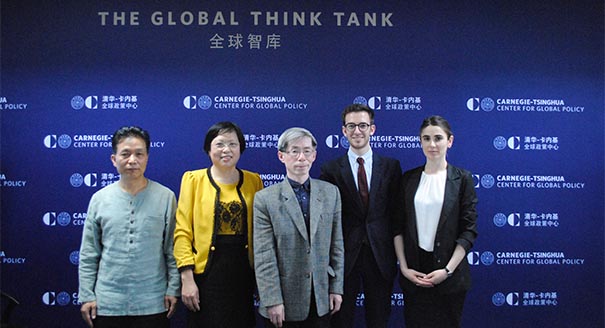Registration
You will receive an email confirming your registration.
During the 13th National People’s Congress in March, “Xi Jinping Thought on Socialism with Chinese Characteristics for a New Era” was incorporated into China’s constitution. In the foreign policy context, President Xi's “New Era” concept indicates a transition to a more active approach to diplomacy, according to some Chinese experts. Still, Xi’s emphasis on “Chinese characteristics” implies that the Chinese government will conduct its international affairs in ways that align with traditional Chinese cultural values, rather than adopt models and principles from the West.
Carnegie–Tsinghua’s Zhang Lihua moderated a discussion with Chinese scholars who will provide local perspectives on how Chinese traditional cultural values will shape a more active Chinese foreign policy and global role. European scholars will provide international perspectives regarding the degree to which traditional Chinese values have affected Chinese soft power and diplomacy over the last decade.
This event was off the record.
DISCUSSION HIGHLIGHTS
- The role of Chinese Philosophy in President Xi’s Foreign Policy: According to some panelists, Xi Jinping’s foreign policy agendas, such as the Chinese Dream and the community of shared destiny, are influenced by classical Chinese philosophies that consider protecting people’s wellbeing as the principle interest of the state. One scholar explained that China has always viewed the paternalistic family relationship as a micro-model for state governance. Another panelist suggested that the community of shared destiny reflects Laozi’s pacifist ideas, which consider all people in tianxia (天下), or under the heavens, and equal regardless of their backgrounds.
- Chinese Alternatives to Western Theories of International Relations: One speaker summarized the influence of Chinese classical philosophy on foreign policy by discussing two different forms of the word “he.” The first he (和) means not only peace, but also a harmonious balance with nature. With regard to foreign policy, the speaker argued that China’s conception of this “he” does not disallow all forms of military force, but justifies a defensive use of force because survival is a natural goal of a state. The same speaker suggested that China is also driven by another he (合), or desire for positive outcomes. Thus, the government views spreading its economic success abroad as its responsibility as a major power.
- Similarities between Xi Jinping and Deng Xiaoping’s Foreign Policy: Multiple Chinese discussants said that Xi Jinping’s foreign policy directive of fenfayouwei (奋发有为), or “striving for achievement,” is not a departure from, but rather a continuation of Deng Xiaoping’s taoguangyanhui (韬光养晦), or “hiding strength and biding time.” Speakers noted that, in the 1970s, China had to prioritize internal growth due to its relative lack of wealth and power. Speakers believe that China, having accumulated a remarkable amount of wealth, now naturally feels a sense of duty to play a leadership role in global economic development.
Zhang Lihua
Zhang Lihua is a resident scholar at the Carnegie–Tsinghua Center for Global Policy, where her program examines how China’s core values affect Chinese foreign policies. Zhang is also the director of the Research Center for China-EU Relations at the Institute of International Relations at Tsinghua University.
Ye Zicheng
Ye Zicheng is a professor at the School of International Studies at Peking University.
Wang Hongxu
Wang Hongxu is a research fellow at the International Strategy Institute at the Party School of the Central Committee of the Communist Party of China.
Jean-Charles Galli
Jean-Charles Galli is a research assistant at the Tsinghua University Sino-French Research Center in Social Sciences.
Andreea Budeanu
Andreea Budeanu is a doctoral candidate at the National Institute for Oriental Languages and Civilizations at Paris-Sorbonne University.
